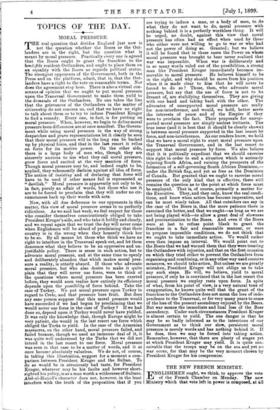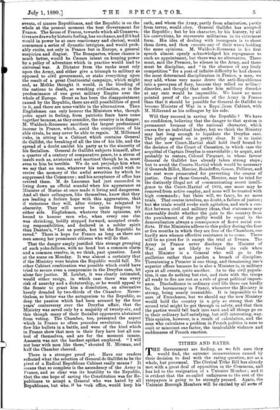THE NEW FRENCH MINISTRY.
TINGLISHMEN ought, we think, to approve the vote 11A of the French Chamber on Monday. The new Ministry which that vote left in power is composed, at all events, of sincere Republicans, and the Republic is on the whole at the present moment the best Government for France. The house of France, towards which all Conserva- tives are drawn by historic feeling, has no chance, and if it had would in power be at once reactionary and clerical, would commence a series of dynastic intrigues, and would prob- ably excite, not only in France but in Europe, a, general suspicion and disgust. The Bonapartes, whose chance is much better, would be Cresars intent on keeping power by a policy of adventure which in practice would lead to universal war. A Dictator from the ranks must rely upon the Army, and either give a triumph to military as Opposed to civil government, or stake everything upon the result of a great Continental campaign, which might end, as Moltke thought it would, in the bleeding of the nations to death, so wrecking civilisation, or in the predominance of one great military Empire over the whole of Europe. Great as has been the disappointment caused by the Republic, there are still possibilities of good in it, and there are none visible in the alternatives. Then Englishmen can only honour the Ministers who, though poles apart in feeling, from patriotic fears have come together because, as they consider, the country is in danger. M. Waldeck-Rousseau sacrifices the largest professional income in France, which, amid the competition of his able rivals, he may never be able to regain. M. Millerand risks in sitting in a Cabinet which contains General de Gallifet, the breaking of all the ties of his life, and the spread of a doubt amidst his party as to the sincerity of his Socialism. General de Gallifet subjects himself, after -a quarter of a century of comparative peace, to a storm of insult such as, aristocrat and martinet though he is, must even-to him be terrible. We do not prejudge him when we say that no man, whatever his nerves, could wish to -revive the memory of the awful severities by which he suppressed-the Commune ; and his acceptance of office has revived them. M. de Lanessan had just succeeded in living down an official scandal when his appearance as Minister of Marine at once made it living and dangerous. And all their colleagues, like themselves, know that they are leading a forlorn hope with this aggravation, that if victorious they will, after victory, be relegated to obscurity. They will never be quite forgiven by either side. Englishmen, whatever their opinions, are bound to honour men who, when every one else was shrinking, boldly stepped forward, accepted crush- ing responsibilities, and declared in a nobler spirit than Danton's, "Let us perish, but let the Republic be saved." There is hope for France as long as there are men among her prominent citizens who will do that.
That the danger amply justified this strange grouping of such yoke-fellows, with no bond but a common alarm -'and a common resolve, is, we think, past question. Look -at the scene on Monday. It was almost a certainty that if the Ministry were beaten the Republic would fall. No other Cabinet combination was possible which could have tried to secure even a compromise in the Dreyfus case, let alone fair justice. M. Loubet, it was clearly intimated, would either resign, in which case there was every risk of anarchy and a dictatorship, or he would appeal to the Senate to grant him a dissolution, an alternative keenly dreaded by two-thirds of the Chamber. Never- theless, so bitter was the antagonism to the Republic, so deep the passion which had been aroused by the four years' controversy over the Dreyfus affair, that the Ministry was saved only by a majority of twenty-six, and this though many of their Socialist opponents abstained from voting. The Chamber, too presented the aspect which in France so often precedes revolution. Insults flew like bullets in a battle, and were of the kind which in France show that men in their fury have lost all con- trol of themselves, and are for the moment insane. Assassin was not the hardest epithet employed. "I will not bear, with men like these," shouted M. Mirman, and half the Chamber cheered.
There is a stronger proof yet. Have our readers reflected what the selection of General de Gallifet to be the pivot of a Radical Republican Cabinet really means ? It means that so complete is the ascendency of the Army in France and so clear was its hostility to the Republic, that the one hope of saving the Constitution was for Re- -publioans to accept a. General who was hated by all Republicans, but who. if he took office, would keep his oath, and whom the Army, partly from admiration, partly from terror, would obey. General Gallifet has accepted the Republic ; but by his character, by his history, by all his convictions, he represents militarism in its extretnest form. His idea of dealing with insurgents is to shoot them down, and then execute any of their wives holding the same opinions. M. Waldeck-Rousseau in his first speech almost openly acknowledged his repugnance to such an appointment, but there was no alternative. There must, said the Premier, be silence in the Army, and there must be discipline, and "in the absence of any lively competition" for a post of infinite difficulty he had chosen the most determined disciplinarian in France, a man, we may add, whose very name drove the anti-Republicans into.a paroxysm of fury, because they relied on militau disorder, and thought that under him military disorder at any rate would be impossible. We know no more pointed proof of the position of the Army in France than that it should be possible for General de Gallifet to become Minister of War in a Repul,lican Cabinet, with M. Millerand as his colleague by his side.
Will they succeed in saving the Republic ? We have no confidence, believing that the danger to that system is permanent because of the national character, which craves for an individual leader; but we think the Ministry may last long enough to liquidate the Dreyfus case. The policy agreed on is pretty clear. It is to insist that the new Court-Martial shall hold itself bound by the decision of the Court of Cassation, in which case the acquittal of Captain Dreyfus is unavoidable ; to acquit, and probably to restore, Colonel Picquart, in whose favour General de Gallifet has already taken strong steps ; but to avoid the Courts-Martial which would be necessary if Generals Billot, Mercier, Boisdeffre, Gonse, Pellieux, and the rest were prosecuted for perverting the course of justice. One of those Generals, Mercier, may be tried for the distinctly illegal act of communicating secret intelli- denc,e to the Court-Martial of 1894, one more may be removed from active employ, and none will be trusted with high commands ; but there will, we fancy, be no more trials. That course involves, no doubt, a failure of justice ; but the trials would evoke such agitation, and such a con- flict between civil and military ideas, that statesmen may reasonably doubt whether the gain to the country from the punishment of the guilty would be equal to the demoralisation always a consequence of fierce social con- flicts. If the Ministers adhere to this policy during the four or five months in which they are free of the Chambers, one hardly sees whence effective resistance is to come. There will be no pivot for it except the trial at Rennes. The Army in France never disobeys the Minister of War, and is not likely to break its rule when that Minister is a General who will go to the guillotine rather than pardon a breach of discipline. Threatening a Premier is one thing, and threatening one's superior officer because he is also a Minister is. in military eyes at all events, quite another. As to the civil popula- tion, it can do nothing but riot, and riots with the troops all ready to fire are not as a. rule of great political import- ance. Disobedience in ordinary civil life there can hardly be, the bureaucracy in France, whenever the Ministry is strong, being nearly irresistible. It is impossible to be sure of Frenchmen, but we should say the new Ministry would hold the country in a grip so strong that the second trial might be got through in safety, and that then the parties would fall back into rank and all things go on in their ordinary half-satisfying, but still interesting, way. This opinion, however, is a result of calculation, and the man who calculates a problem in French politics is sure to omit or miscount one factor, the incalculable violence and suddenness of French emotion.
















































 Previous page
Previous page